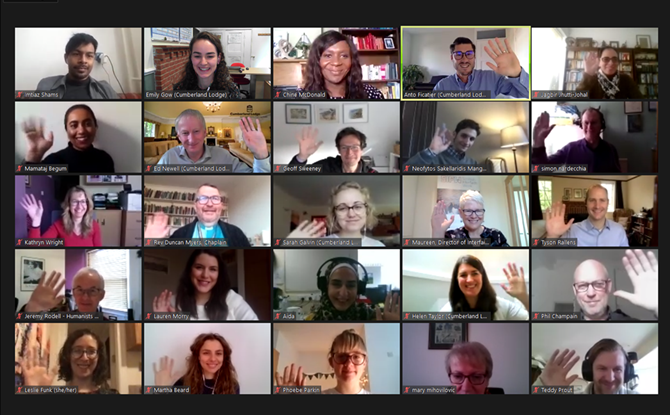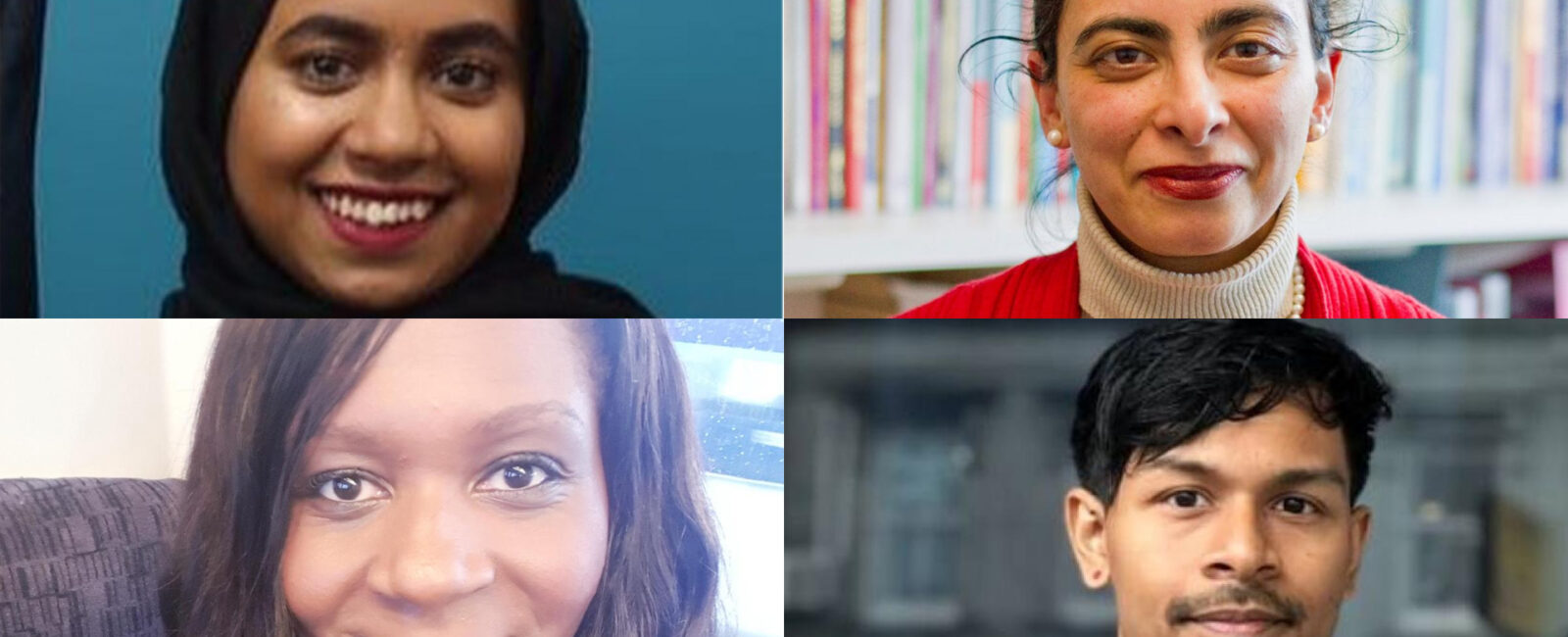Working with the Faith & Belief Forum and Humanists UK, Cumberland Lodge devised its virtual conference, Faith & Belief 2040, to explore the UK’s likely faith and belief landscape of 2040 and to investigate what faith groups, policymakers and individuals might need to do in order to prepare for the changes that may occur.
I attended the four-part conference along with representatives of many faiths and non-faith communities, earlier this month.
The second session in this conference took place on Zoom on Thursday 12 November 2020. We examined the impact of changes in the UK’s faith and belief landscape on people’s identity and the sense of belonging. Four main issues were approached: the fluidity of identities; tensions between religion, politics and racial identity; apostasy and experiences of rejection or acceptance; and religion as an existential crisis.
This session started with brief presentations from four guest speakers:
- Mamataj Begum
- Dr Jagbir Jhutti-Johal
- Chine McDonald
- Imtiaz Shams
Identity fluidity
Participants in this session looked at religion as an identity marker and shared their personal experiences within their own religious contexts. In some faith communities, religion and belief are still important components of self-identity; for example, in Sikh communities, they are often the first or second thing people mention when describing themselves.
However, there are some caveats in relation to this. One of these is that how people identify themselves depends on the context and situations they are in. For example, in non-professional settings, religion typically comes first for Sikhs, and other categories like, gender, nationality and profession follow, but in professional contexts, nationality and profession often come to the fore, with no reference made to religion. One of the guest speakers highlighted that: ‘Identities are complex (multi-layered, fluid) and may not be fixed. We may have single or plural identities, depending on family, community, upbringing and context’.
Another important point raised was that religious identification is not always weaker in younger generations. For example, in the Sikh community, you could argue that religious identification is actually stronger amongst younger generations than in the older generation in the UK, and it looks likely to remain so, as we move towards 2040.
One conference participant referred to an informal experiment she had conducted with her relatives, in which she found out that younger generations have a growing appetite and yearning for religious and cultural identity, more so than older generations, who tended to put it after nationality, profession and other categories of self-identification. However, the extent to which this identification by religious community is borne out of a deeply felt religious sentiment is unclear.
Tensions between religion, politics and racial identity
The discussion also examined tensions between religious beliefs and racial identity. An example was given of someone who was raised in the evangelical Christian church whose upbringing and subculture (what she watched, what she read, the political views, and her biblical practices) shaped her identity.
She also explained how she started to see and understand her religious ‘subculture’ from an outside perspective when she started studying theology at university. She said: ‘I saw it as my personal mission to try and ‘detoxify’ the brand that had become so entangled with a version of Christianity that I could no longer sign up to, and I clearly no longer belonged to.’, and she mentioned feeling a growing tension between her religion beliefs, political views and racial identity.
One of the guest speakers explained this idea by drawing on the Black Lives Matter movement and the US Presidential Elections, and reminded us that 81% of white evangelical Christians voted for him in 2016 and again this year. This speaker had tried to disentangle her faith from political views she disagreed with, and she suggested that your religious belief is meaningless if it doesn’t affect your political views and how you view the world.
Ideas of white masculine supremacy that exist within some forms of Evangelicalism and the Church of England was highlighted. One speaker said: ‘Whiteness is more important than righteousness, and that God in their eyes is reduced to a macho white man whose only purpose is to make them great again.’ At the end, she expressed her eagerness for a future of Christianity that embraces every identity.

Apostasy – rejection and acceptance
Conference participants also explored the issue of apostasy – the rejection of one’s religion – in relation to the declining levels of religious identification in the UK today. One of the issues raised was the choice of words used to describe people who leave their religions. Every religious group has a word to describe an ‘outsider’, but it almost always has negative connotations. ‘Formerly religious’, ‘ex-religious’ or ‘apostate’ tend to be the most acceptable and least offensive.
Discrimination is another issue relating to apostasy. People who choose to leave their religion – whether it is Islam, Judaism, Christianity or another – may experience different forms of discrimination, but the suffering is the same. The discussion explored different examples of discrimination against apostates, from various faith and belief settings. In some cases, an apostate is threatened, for instance with family rejection, removal of his or her children, disconnection from their loved ones, or even violence (e.g., rape, murder or beheading) but these threats are not always carried out.
Regarding data on numbers of apostates, we heard that there is scarcity of research and very few statistics are available. For example, in 2019, 2.8% of people from Islamic background left Islam in the USA.
Another important point that we touched upon is how fluid identity can be, and how apostates are often unsure of how to identify themselves.
Religion as an existential crisis
We also explored the complex and interwoven nature of identity, and the interplay between nationality as a defining factor of one’s identity, and other markers, such as faith, race, class, gender or sexuality.
One contributor described her personal journey of searching for identity and belonging. She was brought up as a Muslim and had to wear a Hijab, but as a young adult she found she did not know why. She was an immigrant to the UK, but it was her family who had made the decision to make that move. She felt British, but people in the UK tended to see her as an immigrant, first and foremost.
She found herself in a maze of existential questions: What am I? Where am I in the world? What do I have to hold on to? The most influential thing that helped her to answer these questions was the internet. She ultimately reached her own conclusions about faith and belief, and grew to become comfortable with her more liberal take on religion, but with strong foundations of values according to the teachings of God and Islam.
We discussed the increasing importance of community centres and coffee shops as spaces for young people to meet and discuss religion, rather than traditional places of worship, such as churches or mosques. Even aside from the COVID-19 pandemic virtual meetings and conferences within faith communities can offer a sense of home and community for people of faith, especially for those who are on the margins.
According to one participant, in 20 years from now, faith will remain a crucial marker of identity just as ethnicity, class, and gender. She said that: ‘Religious identities will still exist, and they’ll still matter, because they exist.’ Finally, a guest speaker confirmed that it will take generations to eradicate faith as am identity marker.
Key take-aways
The following ideas struck me, as I listened and took part in the breakout group discussions and made me think more deeply about the issues at stake:
- Young people who actively engage in religious events and communities can become more confident in their own identities.
- Religion and religious communities aren’t monoliths, and therefore identities do not fit neatly into a single box.
- Leaving a religion does not necessarily mean leaving for nowhere, without a moral compass; rather, it is often leaving because you subscribe to a different worldview, such as humanism.
- Religion is easily politicised, and faith and belief identities are often linked with nationalism and other potentially divisive political issues.
- Faith and non-faith communities and their leaders have a duty and responsibility to support apostates.
If we look at the concept of humanism – not as a philosophy, but as a word – we can find that it encompasses uncountable values and morals, including love, tolerance, sympathy, freedom of speech, integrity, collaboration with others, celebrating differences and individualism, spirituality and rationality. When we compare these with all types of religion in their purist forms, we find that the same values and ethics apply. This makes me wonder, is the humanist approach a unifying source of identity, within which one can use different names for those values and ethical standards, depending on the religion that one follows, and other markers of identity should come next?
I believe it is important that the focus of discussion shouldn’t solely be about how faith impacts on our identity; rather, it should be about how other external factors that are reflected from the ugly side of humanity have distorted the purity of various religions and beliefs.
What stood out for me, personally, was that as we move towards 2040, we need to stick more to our common humanity – our humanism – and our pure faith, in order to preserve a small part of our innate spirituality in the midst of an increasing rise of secularity and materialism. As a religious person and a follower of many faiths – including Islam, Judaism and Christianity – I would be proud to define myself as a humanist Muslim.


